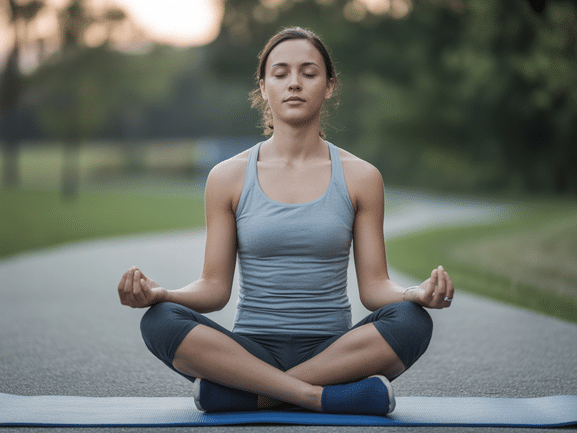Finding Your Zen: A Gentle Guide for Women Navigating Menopause
Picture this: you’re in the middle of an important meeting when suddenly, a wave of heat washes over you. Your heart races, your palms sweat, and you feel like you’re losing control of your own body. Sound familiar? If you’re navigating menopause, you’re certainly not alone in experiencing these challenging moments.
But what if there was a gentle, time-tested approach to finding peace amidst the chaos? Enter Zen – an ancient philosophy that offers profound wisdom for women experiencing the transformative journey of menopause.
What is Zen? Understanding the Path to Inner Peace
Zen, at its core, is about finding clarity in simplicity. Originating from Buddhist traditions, zen philosophy emphasizes mindfulness, present-moment awareness, and acceptance of what is. For women in menopause, this isn’t just spiritual wisdom – it’s practical medicine for the soul.
Unlike complex meditation systems, zen meaning centers around three fundamental principles:
- Presence: Being fully aware of the current moment
- Acceptance: Embracing change without resistance
- Simplicity: Finding peace in life’s basic experiences
These principles align beautifully with what women need during menopause – a way to navigate change with grace and inner strength.
Why Zen is Perfect for Menopause: The Science Behind Serenity
Research shows that meditation for menopause symptoms can significantly reduce hot flashes, improve sleep quality, and stabilize mood swings. Moreover, zen practices work by regulating your nervous system, helping you respond to physical and emotional changes with greater equanimity.
Hot Flash Relief Through Mindfulness
When a hot flash begins, instead of panicking, zen teaches you to observe the sensation without judgment. This mindfulness menopause relief technique can actually reduce the intensity and duration of hot flashes by preventing the stress response that often amplifies them.
Emotional Balance During Hormonal Changes
Menopause can feel like an emotional rollercoaster. Zen practices help you develop what Buddhists call “equanimity” – the ability to remain balanced regardless of external circumstances. This doesn’t mean suppressing emotions, but rather learning to witness them without being overwhelmed.
Sleep Sanctuary Through Zen
Night sweats and insomnia are common during menopause. Zen meditation before bed can calm your nervous system, making it easier to fall asleep and stay asleep. The practice of letting go of the day’s worries becomes a powerful tool for restorative rest.
Practical Zen Techniques for Daily Menopause Support
Ready to bring zen into your daily routine? Here are four simple yet powerful practices specifically designed for women navigating menopause:
1. The 5-4-3-2-1 Grounding Technique
When you feel overwhelmed by symptoms, try this instant grounding method:
- Notice 5 things you can see
- Identify 4 things you can touch
- Listen for 3 things you can hear
- Find 2 things you can smell
- Acknowledge 1 thing you can taste
This technique brings you immediately into the present moment, interrupting the cycle of anxiety that often accompanies menopause symptoms.
2. Hot Flash Breathing
As soon as you feel a hot flash coming on, practice this zen breathing technique:
- Breathe in slowly for 4 counts
- Hold for 4 counts
- Exhale for 6 counts
- Repeat 3-5 times
This activates your parasympathetic nervous system, often reducing the intensity of the hot flash.
3. Morning Zen Ritual
Start each day with a simple 10-minute practice:
- Sit quietly with your morning tea or coffee
- Focus on the warmth of the cup in your hands
- Notice the aroma and taste
- Set an intention for embracing whatever the day brings
This creates a foundation of calm that can carry you through challenging moments.
4. Evening Acceptance Practice
Before bed, practice letting go of the day:
- Reflect on three things you’re grateful for
- Acknowledge any difficult moments without judgment
- Send loving-kindness to yourself for navigating this transition
- Release any expectations about sleep or symptoms
Yoga During Menopause: Movement as Meditation
While zen often emphasizes stillness, yoga during menopause offers a moving meditation that can be particularly helpful. Gentle flows, restorative poses, and breathing exercises combine the physical benefits of movement with the mental clarity of zen practice.
Poses like Child’s Pose, Legs-Up-The-Wall, and gentle twists can help regulate your nervous system while building strength and flexibility. Furthermore, the mindful attention required in yoga perfectly complements zen philosophy.
Creating Your Personal Zen Space
You don’t need a meditation room to practice zen. However, having a dedicated space – even just a corner of your bedroom – can support your practice. Consider:
- A comfortable cushion or chair
- A small plant or flowers
- A journal for reflections
- Perhaps a candle for evening practice
The key is simplicity. Your zen space should feel peaceful and uncluttered, reflecting the clarity you’re cultivating within.
The Vitalizen Connection: Guided Support for Your Journey
While zen practice can be deeply personal, having guidance can accelerate your progress. Vitalizen.app offers specifically designed meditation and yoga sessions for women in menopause, combining ancient zen wisdom with modern understanding of hormonal changes.
Whether you’re dealing with sleep issues, mood swings, or simply seeking greater peace during this transition, our guided practices can support your journey toward inner balance.
Frequently Asked Questions About Zen and Menopause
How long does it take to see benefits from zen practice during menopause?
Many women notice immediate benefits like reduced anxiety and better sleep quality within the first week of consistent practice. However, deeper changes in how you relate to menopause symptoms typically develop over 4-6 weeks of regular zen meditation.
Can zen practice replace hormone therapy?
Zen practice is a complementary approach that can significantly help with menopause symptoms, but it’s not a replacement for medical treatment. Always consult with your healthcare provider about the best comprehensive approach


